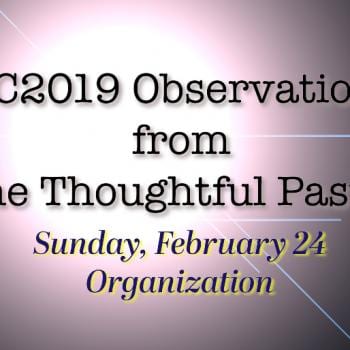The Nature of Grace
I’ve got the whole concept of grace heavy on my mind today. In a world held together by a gracious God, I am more and more aware that we don’t always receive what we want and never receive what we deserve.
Others have written eloquently about this subject, particularly Dietrich Bonhoeffer: “cheap grace is the preaching of forgiveness without requiring repentance, baptism without church discipline, Communion without confession. Cheap grace is grace without discipleship, grace without the cross, grace without Jesus Christ,” and Philip Yancey, “God dispenses gifts, not wages. None of us gets paid according to merit, for none of us comes close to satisfying God’s requirements for a perfect life. If paid on the basis of fairness, we would all end up in hell… In the bottom line realm of ungrace, some workers deserve more than others; in the realm of grace the word ‘deserve’ does not even apply.”
Troubling Events
I will not write with such eloquence, but I do write with these things in mind: the troubling events of the last week where Bishop Bledsoe was involuntarily retired and then not given the an episcopal appointment he expected assuming an appeal of the ruling for the involuntary retirement.
According to the reports, the committee who had the responsibility of evaluating Bishop Bledsoe’s work chose to take the path they saw as most compassionate and most gracious: encourage him to take voluntary retirement so he could go out with honor and with reputation essentially intact. Then he could assume, without stain or question, some of the responsibilities and privileges that are awarded to retired bishops.
Bishop Bledsoe indicated that he would have rather this be fought by people filing formal charges against him and duking it out in a church court. Those charges may now be filed, so he may have his wish.
Which Option Most Gracious?
Now, which of those choices most fully represents the kind of grace we hope to receive from God?
I will readily tell you that my sympathies are with the first options–an honorable way out, reputation intact, and damage control beginning. But there is a major downside: truth will not fully be told and rumors will abound. Real healing does not take place in an atmosphere of secrets and partial truths. And there is a bundle of healing that needs to take place here.
This is an important issue, not just for us, but for the larger world of Christianity. I’ve written more about that here.
The second option troubles me because it means drawing sides, determining winners and losers, and the introduction of lawyers into the mix. There is a reason why the Apostle Paul was horrified nearly 2000 years ago to learn that Christ-followers have taken their conflicts to courts. Lawyers have important functions, but bringing out healing truth is not among them. Rarely does graciousness invade the courtroom.
We Must Acknowledge Sin
So I go back to the nature of God and what it means that God is gracious to us. I know that when I don’t acknowledge my own sins, I am simply unable to gain freedom from them. I must name them in order to find forgiveness. I must repent in order to move in a different direction.
When grace permeates that process, my confessions are done with a combination of hope and tears, but without fear of a punitive response from the hand of God. Nonetheless, I will indeed experience human results of choosing sin over righteousness.
Why? Because God must also hold with gracious tenderness those who have been hurt by my sin. Sin is never an individual act. It always affects the larger community. Even so called “victimless” sins stain the soul. A stained soul, particularly one laden with secrets that must not be disclosed for fear of repercussions, cannot freely move within any relational activity, be it family, church, friends or workplace. There are always wider ramifications. Always.
The Necessity of Church Discipline
Since God must hold with grace those in the larger community as well as the individual, and since all want the fullness of grace (even if not knowing those words or having a real understanding of the concept) restoration becomes a communal act. Sometimes that restoration means that the individual, especially one who will not acknowledge wrongdoing, must be sent from the community. This is what the Scriptures mean in the passages about church discipline.
I have heard horror stories about people being kicked out of churches for the most trivial of reasons. I have talked with numerous deeply wounded people who have experienced the worst of a rigid, judgmental, and apparently hate-filled churches. The decision to ask someone to leave a community must be done with multiple safeguards and with careful awareness of our own need for grace. Sometimes, however, like it or not, expulsion is the most gracious of all acts.
Let’s go to the behavior of children for an illustration. When children are not taught how to conduct themselves in a manner in which they recognize the rights of others as well as their own, they are set up for a lifetime of rejection. It is not gracious to let rude, insensitive bullies have their way. It is not gracious to refrain from teaching children self-control so they have the tools to navigate schools and workplaces. It is not gracious to reward or even ignore tantrums and selfish acts, for the child not properly corrected and taught more healthy ways to deal with human interactions will grow into an incompetent adult. Sometimes, we need to expel children for a time from the community until more adequate decisions about behavior are reached and implemented.
Simply, grace sometimes means we don’t get what we want, but means we get what we need to move to maturity, be it spiritual, social, physical or intellectual.
We Don’t Get What We Deserve
The other side of grace is that we also don’t get what we fully deserve. Those who are willing to receive grace, and the correction, teaching, instruction and shaping that comes from grace, begin to gain eyes and develop sensitive souls that perceive the Kingdom of Heaven. They find the entrance to that holy place.
Do any of us deserve entrance? Certainly not. We are given an invitation–but we do need to be clothed in the proper clothes. Those clothes are given in the acts of repentance coupled with willingness to receive correction.
To go back to this situation with Bishop Bledsoe, it appears that some seek did offer correction and that he received them as those who either had different opinions or were operating out of sour grapes. Could they have spoken more strongly? Perhaps. I think there is a language issue here, and I’ve written about it here. But why would that become necessary?
At some point, the habit of not listening to correction becomes ingrained in human hearts, minds and souls. People become like hardened soils where the seeds are eaten by birds and the blessing of rain just runs off, unable to sink in. Then the sweet invitation to confession, repentance, restoration and adjusted paths can no longer find response.
Was the Resolution Gracious?
So, has what happened been gracious to all concerned? I am saying a qualified yes. I suspect the original decision to encourage the Bishop to retire without the necessity of disclosing more fully the problems moved a bit close to cheap grace, although done with the best of intentions. The Bishop’s refusal to receive it this way ended up moving us closer to real grace–because some things have had to be disclosed. The decision to remove him from episcopal leadership for the present shows a wider grace to the larger connection as well as to Bishop Bledsoe, for it would not be possible at this time for him to serve without significant shadow and for genuine trust relationships to build.
The more full manifestation of grace will appear as every participant or observer of this very tough situation seeks greater capacities for self-reflection and lovingly-given, truth-based accountability.
















